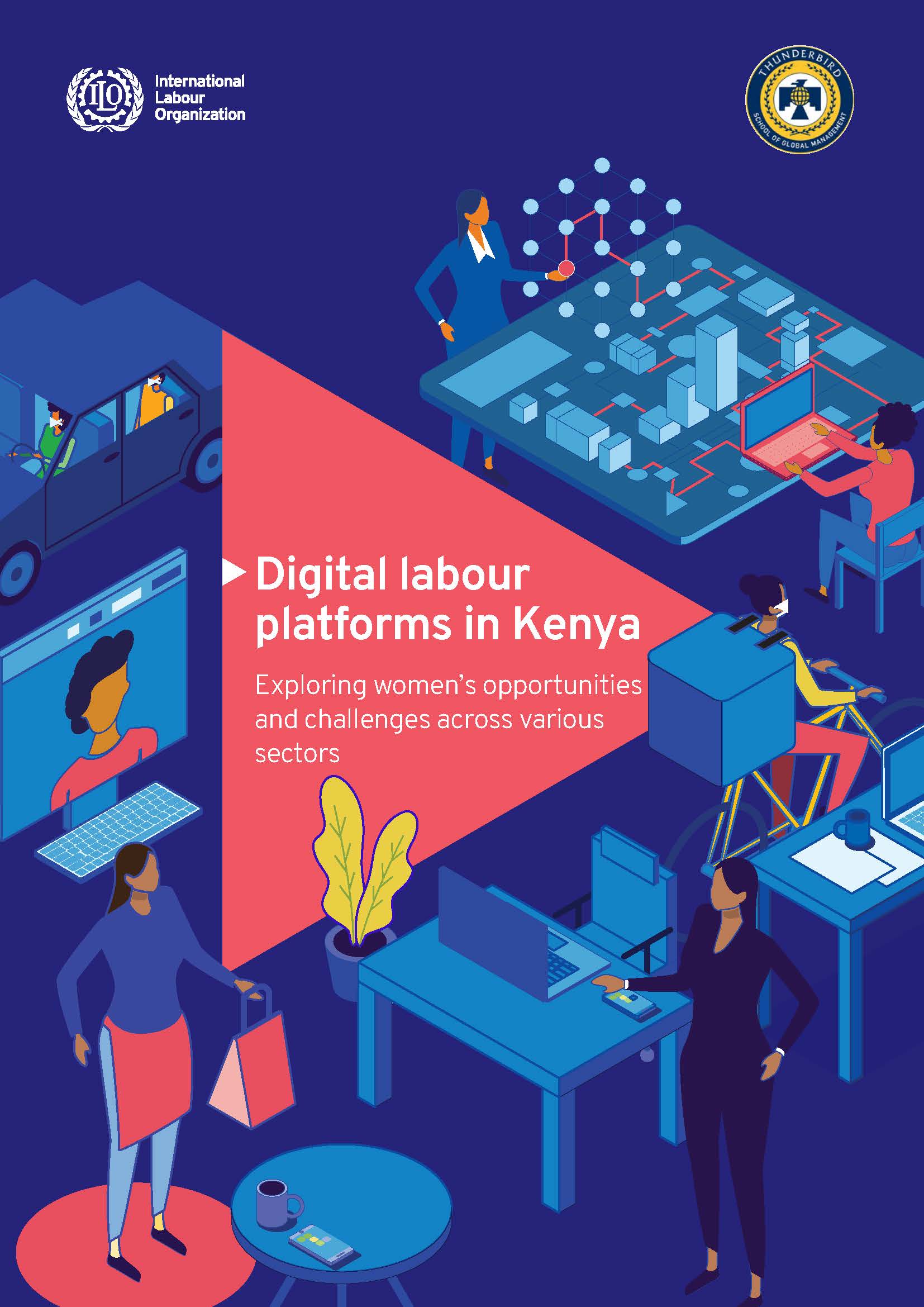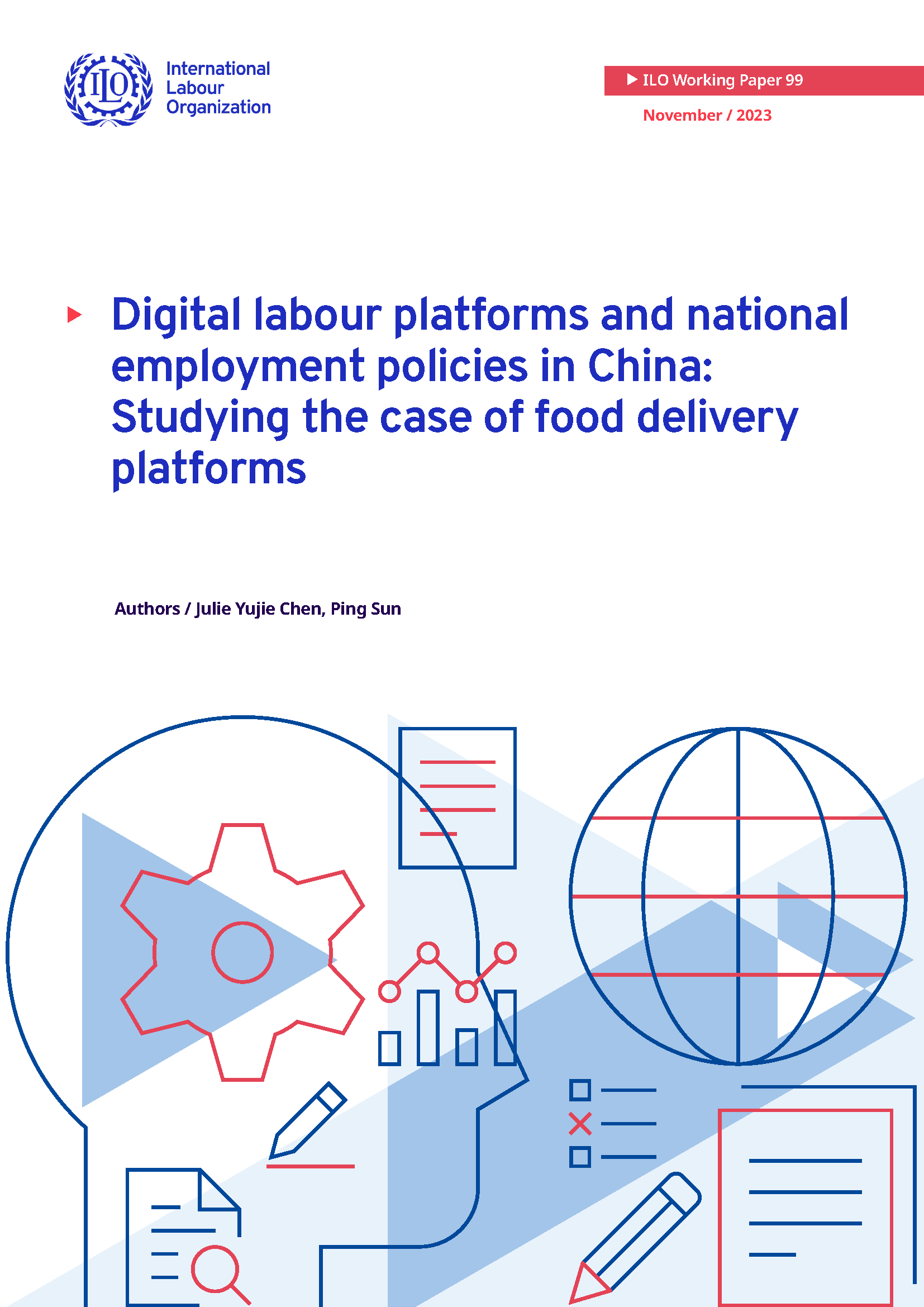Publications
2024
-

New technologies, e-government and informality
15 April 2024
This working paper studies the complex relationship between technology adoption and informality, leveraging recent cross-country data to analyse the effects of mobile phone subscriptions, internet access, automation and e-government on informal employment, vulnerable employment, and the shadow economy's GDP share.
-

Guidelines for developing inclusive water, sanitation and hygiene infrastructure
22 March 2024
This publication builds on the experience of five organizations working towards inclusive WASH infrastructure development around the world: the United Nations Office for Project Services, the United Nations Children's Fund, the International Labour Organization, WaterAid and Arup.
-

Digital labour platforms in Kenya: Exploring women’s opportunities and challenges across various sectors
20 March 2024
This report explores how the expansion of digital technologies such as digital labour platforms is reshaping Kenya’s economic landscape, and the experiences of workers engaged on these platforms, especially women.
-
EIIP Afghanistan News Brief, Issue 9
12 March 2024
This brief seeks to share news and information about the activities of the EIIP Afghanistan project. This ILO project, funded by the Special Trust Fund for Afghanistan (STFA), is meant to promote employment and decent work in the Humanitarian- Development-Peace Nexus.
-

Productivity measurement and analysis: A guidance note
05 March 2024
-

Old-age workers transition into retirement and risk of poverty
19 January 2024
-
EIIP Afghanistan News Brief, Issue 8
10 January 2024
This brief seeks to share news and information about the activities of the EIIP Afghanistan project. This ILO project, funded by the Special Trust Fund for Afghanistan (STFA), is meant to promote employment and decent work in the Humanitarian- Development-Peace Nexus.
2023
-

Examining persistent labour force transitions during the COVID-19 pandemic
18 December 2023
Examining persistent labour force transitions during the COVID-19 pandemic. Evidence from four developing countries
-

Employment Intensive Investment Program (EIIP) and decent work in Jordan
07 December 2023
The overall strategic objective of the project is to support a more inclusive and accessible green labour market for vulnerable Syrian refugees and Jordanian men, women and persons with disabilities.
-

Support to livelihoods through cultural heritage development
07 December 2023
The core competences of UNESCO and ILO come together in this project to ensure dignified, sustainable livelihoods and create economic opportunities for Jordanians and Syrians through culture as a source of resilience.
-

Support to livelihoods through cultural heritage development in Jordan 2020 - 2024
07 December 2023
Employment Intensive schemes in the northern governorates of Jordan help improve self-reliance through access to immediate short-term decent employment opportunities for Jordanians and Syrians in the cultural heritage sector.
-

Guidelines for developing inclusive transport infrastructure
06 December 2023
This guidebook, jointly developed by ILO, UNOPS, UN-Women and Arup, provides practical advice to mainstream inclusion in infrastructure development.
-

Ex-ante Employment Impact Assessment of the SMART GRID project in Senegal
06 December 2023
-

Employment Impact Assessment of the PASE II project in Senegal
06 December 2023
-

Digital labour platforms and national employment policies in China: Studying the case of food delivery platforms
04 December 2023
This paper takes the food-delivery platforms as a case study to examine the impact of digital labour platforms on employment and labour market in China. It reviews the recent employment policies in the digital economy including policies of labour relations, social security, wages, etc., and suggests the new approaches and elements for the comprehensive national employment policies framework in the era of digitalization in China.
-

ILO/EIIP support to the Expanded Public Works Programme in South Africa
13 November 2023
ILO/EIIP is providing support to the Expanded Public Works Programme in key thematic areas including Policy Development and Promotion, Skills/Capacity Development, Project Management and Technical Support, Research and Innovation, and Advocacy and Partnership.
-

Employment-Intensive Investment Programme in South Africa
13 November 2023
The Expanded Public Works Programme (EPWP) is a short to medium term intervention of the Government of South Africa which seeks to address the triad national challenges of unemployment, poverty and inequality through employment creation in provision and delivery of public infrastructure works by application of labour-intensive methods.
-
Engaging multinational enterprises on more and better jobs
10 November 2023
The ILO approach to responsible global business - Sustainable Enterprises
-

EIIP Afghanistan News Brief, Issue 7
08 November 2023
This publication seeks to share news and information about the activities of the EIIP Afghanistan project's activities. The Special Trust Fund for Afghanistan (STFA) is funding this project and ILO is implementing it as an intervention for Promoting Employment and Decent Work through the Humanitarian- Development-Peace Nexus.
-

SCORE Programme Brochure
01 November 2023